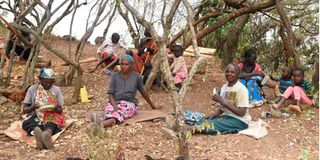State orders schools in Baringo reopened

Some of the internally displaced locals who fled Kapturo village in Baringo North Sub-County take refuge at Kapkomole village on March 15.
The government has ordered that schools in banditry-prone Baringo North and Baringo South sub-counties that had been closed in March due to incessant attacks be reopened.
More than 20 primary and secondary schools in the regions are yet to re-open for the first term after locals fled their villages to safer areas. This has left the fate of more than 5,000 learners hanging in the balance as schools reopened last week.
Some of the affected schools are Karne, Koitilil, Kapkechir, Tuiyotich, Arabal, Kapindasum, Kasiela, Sinoni, Chebinyiny primary schools, and Tuiyotich and Embosos secondary schools in Baringo South.
In Baringo North, schools that are yet to reopen include Chepkesin and Kapturo primary.
Some schools that have reopened but record low enrolment are Kagir, Chemoe, Kamwetio, Yatya, Kosile, and Ng’aratuko primary schools and Yatya Secondary School.
Baringo County Commissioner Abdirisack Jaldesa, while ordering that the schools be re-opened on Wednesday, said: “We have enough food which will be distributed to the institutions. We urge locals to go back to back to their homes because we have put in place enough measures to guarantee them their security.”
Also Read: Rift Valley's top schools continue to shine
Last Friday, the administrator in the company of the county security team, the clergy and local leaders toured the area to quell heightened tensions following the killing of three people in the area.
The three were shot dead in three separate incidents on Wednesday in Ng’aratuko and Loruk villages in Baringo North.
Locals who fled the border villages two months ago are yet to return to their homes.
Some of the villages deserted since the beginning of the year are Kitorongon, Menmeno, Seretion, Chepng'anian, Kapsikwon, Lomulel and Korkoron, Kapkechir, Tuiyotich, Ramacha, Katilomwo and Tandar. Kapindasum, and Soke, and Korkoron in Baringo South. The latest exodus happened in March, after the killing of eight people in Kasiela and Sinoni villages. It saw a mass exodus from the adjacent villages of Arabal, Lamaiywe, Korkoron, Karne and Kapkechir.
Other deserted villages in Baringo North include Chepkesin, Ng’aratuko, Kapturo, Katulia, Sitek, Kamukule, Kapkormate, Kamwetio and Chepkewel.
During a peace forum on Friday at Loruk on the border of Baringo North and Tiaty sub-counties, Mr Jaldesa said more security officers have been deployed in the region.
“Apart from the recent incident, there has been a relative calm in the county for more than a month owing to the efforts we have put in place to bring normalcy. The 80 police reservists enlisted in March are also doing exemplary work by repulsing the armed bandits from stealing livestock and staging attacks,” he stated.
The administrator warned chiefs and their assistants against abetting cattle theft and banditry by shielding the perpetrators.
“More than 38 livestock are yet to be recovered after the Wednesday raid in Ng’aratuko and we are informed that they were driven towards Tiaty West. I want chiefs to ensure that all the stolen livestock are returned. I am making follow ups to ensure it is effected,” said the administrator.
Baringo Deputy Governor Jacob Chepkwony wondered why the criminals who have been wreaking havoc for years have not been arrested and charged.
“If we must end this perennial problem once and for all, we must also be sincere to ourselves and single out the attackers terrorising people. We cannot be holding peace meetings for years yet none of the perpetrators has been arrested and charged for the misdeeds,” said Mr Chepkwony.
Baringo North parliamentary aspirant Joseph Makilap regretted that many families in the area have been impoverished and women widowed.
“In the Wednesday attacks, one of those killed is a man whose brother was shot dead a month ago and hundreds of his livestock driven away. The children have now been left poor with no parents yet we have a government in place,” said Mr Makilap.
He faulted locals for failing to name the suspects.
Baringo Africa Inland Church Bishop William Kotut urged locals to maintain peace. The cattle raids, Mr Kotut said, is archaic and will not benefit the area but instead impede development.





